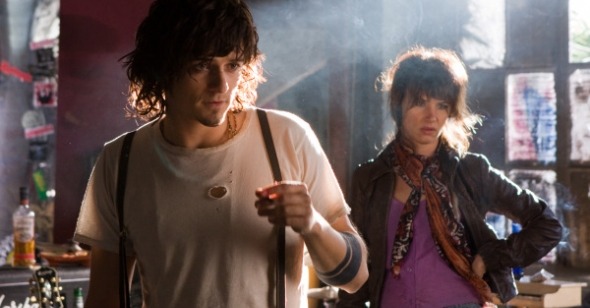Ladies and Gentlemen, the Not-So-Fabulous Stain
by Justin Stewart
Sympathy for Delicious
Dir. Mark Ruffalo, U.S., Maya Entertainment
God works in mysterious ways. That’s the lesson that Mark Ruffalo got behind a camera for the first time to deliver. It might not seem so at first, but the actor’s directorial debut, a “labor of love” that he says took him ten years to make, hides a soft, spiritual heart underneath its edgy façade of bearded homeless angst and scummy “thrash rock.” Its hero has a mystical healing grip that he must learn to accept, but since he’s acknowledged by a priest friend as God’s conduit, he’s the anti-Paul (that already forgotten, Seth Rogen–voiced, smugly atheist alien who could also cure with a touch). The Catholic-raised Ruffalo and screenwriter-star Christopher Thornton can’t be faulted simply for wanting to create another Christ allegory for our times, but almost all of the choices they’ve made in going about it are baffling. Hinging on an uneasily swallowed supernatural gimmick, and full of out-of-touch rock band clichés, Sympathy for Delicious begs the question: is it all a joke? It even ends with the Bee Gees’ “I Started a Joke.” Ultimately, no—though there are stabs at comedy, the movie, in all its incoherence and absurdity, comes from an earnest place.
The “Delicious” of that grotesquely awkward title is Dean O’Dwyer, a paraplegic Angeleno living out of his car who DJs under the name Delicious D. Thornton, himself wheelchair-bound with a broken back, plays D as a mostly unlikable cauldron of resentment and self-pity. He has reasons to be surly. Before his motorcycle accident, he was a hot talent making a name for himself in the club scene. Now, wheeling onstage for a set one night, he complains that the table is too high, only to be insulted and ejected by a callous club stooge. Though his hateful churlishness (a defense mechanism) might rightfully earn him his isolation, a large-hearted priest (Ruffalo), who feeds D and the other lost souls that inhabit their particular skid row near some godforsaken L.A. underpass, compassionately suggests faith healing. D scoffs, but he starts to take faith more seriously when he learns that he has the power to heal invalids with an extended, concentrated touch. This makes him ghetto-popular (the small slum division boasts a dazzling variety of disabilities and illnesses), and Father Joe spies an irresistible opportunity to bring money to his mission. But there’s a caveat that ruins the miracle for Dean: he can’t heal himself.
Between homeless-healings, D is also reentering the music world. Rocker Ariel (Juliette Lewis) knows his talent, and she invites him to try out with her band—please wait for it—Burnt the Diphthongs. It is during all of the band scenes that Ruffalo’s film—again, unless it’s really all a joke—turns alarmingly tone-deaf. First of all, their music (sub-Orgy mid-90s industro-grunge) is terrible, an objective fact that goes unacknowledged. And there’s the casting. As the contemptuous and confrontational lead singer who spouts pretentious edicts (“We’re anti-melody”; “Titillate the masses”) as laughable as his stage name (The Stain), Ruffalo has cast Orlando Bloom, an actor who, as far as I know, has never made anyone laugh. He’s been Legolas and Will Turner, but as this more mundane “badass,” the English actor is neither intimidating nor amusing—his overdone caricaturing is wrong for the movie. Also wrong: a coasting Laura Linney as the band manager who takes offense to D’s rudeness. Her heavy eye shadow is a clever touch—a lame attempt to blend into a young person’s world—but the character is superfluous.
His record-scraping adds another appropriately discordant texture to the band’s sound, but D is dismissed, until he recklessly burns, then cures, one of the members. The Stain sees dollar signs, and Burnt the Diphthongs embark on “Healapalooza,” a string of evangelical circuslike shows during which D heals audience members while the band blares on. D, who felt used by Father Joe, is all too happy to cynically capitalize on his unasked-for gift, and he finally lets it go to his ego. Visually, this means turning into a sedentary Dave Navarro, all fishnet, eyeliner, and a thick coating of douchiness. In Ruffalo and Thornton’s moralistic world, this selling out cannot pay, and D’s rise dutifully devolves into spiritual decay, hilariously rendered as a 1930s-esque cautionary exploitation-style montage of pot, pills, puking, and tits. It’s a prick’s comeuppance, as D slowly, painfully learns that it is not his legs that need healing at all, but his skeptical, self-centered attitude.
Ruffalo simply can’t contain his movie, which has a self-destructive mind of its own. Gone rogue about forty minutes in, Sympathy for Delicious is lost well before its third act even resorts to courtroom scenes. There’s a howler when Father Joe is asked if D is really a healer. “God is the only healer,” he says. The prosecuting attorney: “Objection— speculation!” The literally drive-by Los Angeles photography is forever shaky—Ruffalo’s substitute for a style—and he favors harsh orange filters for the exteriors and grubby, underlit interiors. On the soundtrack, Canadian bands Do Make Say Think and The Besnard Lakes provide moody-ambient relief from the Stain and company’s noise, but there’s no respite from the narrative jumble. These might just be Ruffalo’s growing pains, but he, Thornton, and Delicious D clearly lost the map somewhere along this spiritual quest.
